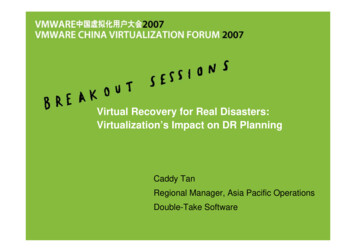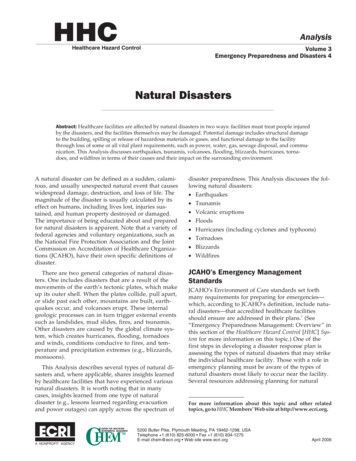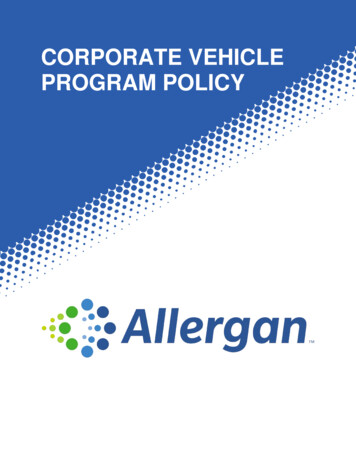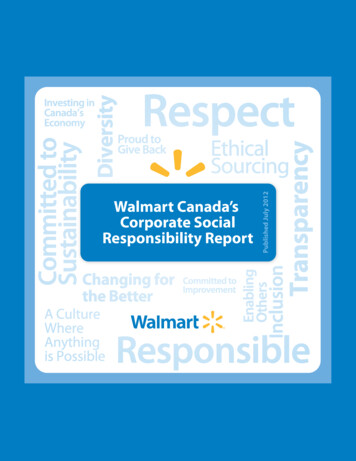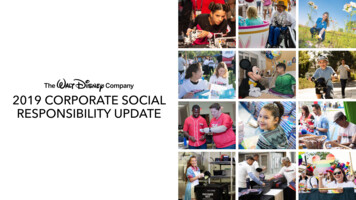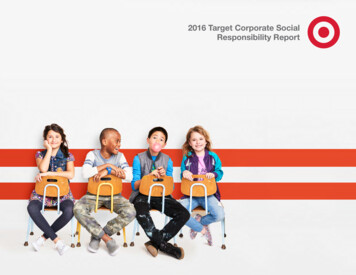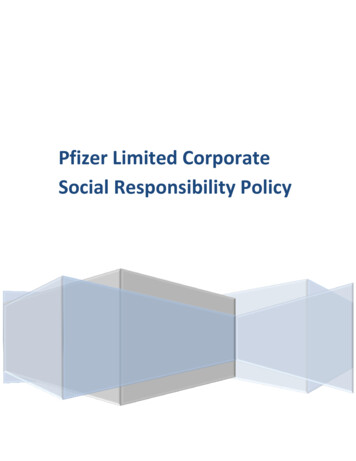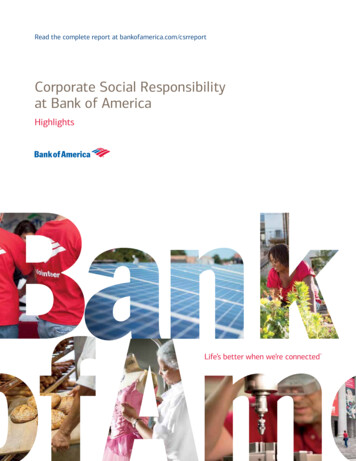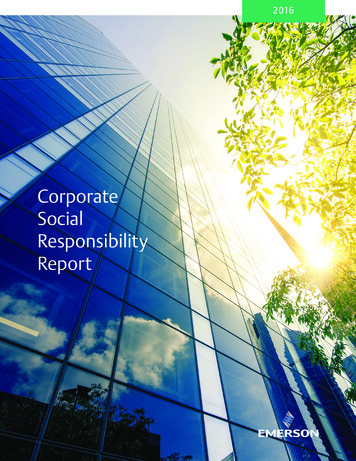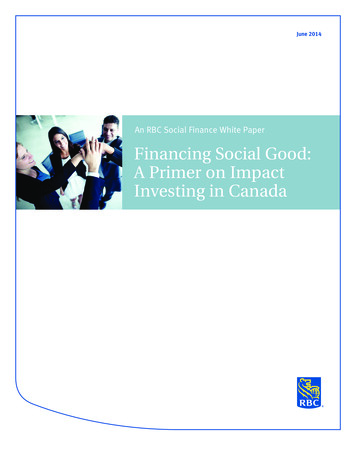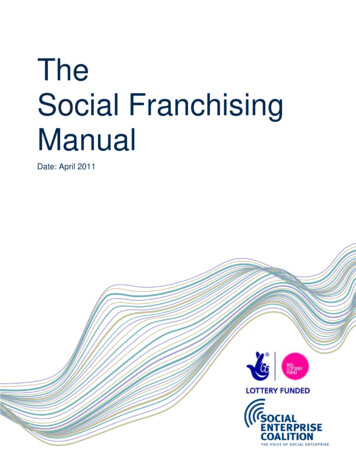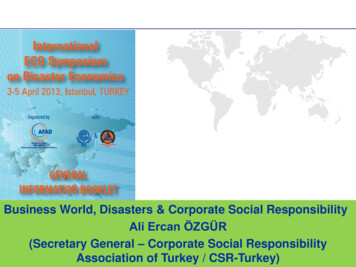
Transcription
Business World, Disasters & Corporate Social ResponsibilityAli Ercan ÖZGÜR(Secretary General – Corporate Social ResponsibilityAssociation of Turkey / CSR-Turkey)
Content Corporate Social Responsibility Business and Disasters The Project for SMEs’ DisasterResiliency
CORPORATESOCIALRESPONSIBILITY3
Complex Business Environment
Complex Business Environment We live in an age of innovation, the growth of free markets, and a worldeconomy. New technologies, new roles for government, and players on the globalscene offer challenging opportunities, demands, and constraints. More people and nations are working together to spread freedom anddemocratic principles; to nurture free markets; to protect individualproperty rights; and to encourage respect for human rights, the rule of law,working conditions and the environment. Although the profit motive of business is understood and accepted, peopledo not accept it as an excuse for ignoring the basic norms, values, andstandards of being a goodcorporate citizen.
GLOBAL CHALLENGES FOR THE CORPORATE SECTOR MANAGING STAKEHOLDER RELATIONS MANAGING THE SUPPLY CHAIN TRANSLATING GLOBAL STRATEGIES INTOLOCAL INITIATIVES MULTIPLE RELATIONSHIPS WITH GOVERNMENT THE WAR FOR TALENT CSR IN TIMES OF RECESSION? MANAGING CLIMATE CHANGE
CSR PyramidArchie Carroll, 1991Social ResponsibilityEthical ResponsibilitiesRegulatory ResponsibilitiesEconomic Responsibilities
CSR 2.0UniqueActionsCorporateCitizenshipCSR & PhilantrophyCorporateGovernanceEthical R.Regulatory R.Environment&ClimateEconomic R.Environment& Climate
CSR Definition 2011 – 2014 – EU New Policy CSRAccording to the European Union CSR represents “a concept whereby companies integratesocial;environmental, ethical humanrights and consumer concerns in theirbusiness operations and in theirinteraction with their stakeholders on avoluntary basis.”
Current and future CSR trends:European Cartography on CSR
EU Enterprise 2020
CORPORATE SOCIAL RESPONSIBILITYASSOCIATION OF TURKEYValuesPoliciesActivitiesHumanOur engagement to SocialResponsibilityAwareness ProgramsChangeThe Interaction of SocialStakeholder GroupsCampaignsSocial DialogueParticipationMutual RelationsResult Oriented WorkAbility to Create ValuesCreativityConsultancy ServicesSustainabilityActive Learning ProcessesEducation andPublicationsSocial StakeholderEngagementSertification andReporting
CSR – TURKEY – Key Partners
CSR Trends UNDP – Turkey CSR Situation ReportUkraine CSR Situation ReportIran CSR Situation ReportFounder CSR Black Sea NetworkFounder Black Sea CSR NetworkCSR AzerbaijanCSR UkraineCSR IranILO CSR and Work Environment Report Need for supply chain focus Need for code of conducts–Disasters14
Istanbul Companies in Numbers Number of Registered Companies to Istanbul Chamber of Commerce– 688.440 (March 2013) Number of Registered Companies to Istanbul Chamber of Industry– 13.000 More than 98% are SMEs According to Istanbul Chamber of Commerce– 438.275 Companies were established in Istanbul after 1999 Earthquake More than half of the companies in Turkeydoes not have disaster experience!15
BUSINESS ANDDISASTERS16
International Disaster ds17
18
19
According to New Scientist - http://www.newscientist.com20
Global Risk Data PlatformUNEP / GRID Europe /UNISDR(Disaster Risk Reduction)http://preview.grid.unep.ch/21
Economy in Disasters Economic losses during disaster Allocation of of funds/resources(includingvoluntary support) for emergencyneeds(rescue, first aid, basic needs) Project funding for recovery andnormalization Business Recovery Investments–Reintegrating into economy–SMEs22
General Statistics from US Chamber of Commerce A survey of 2,500 business owners and decision makers foundthat:– 71% of small businesses did not have a disaster plan in place– 64% said that they did not need one According to The Hartford's Guide to Emergency PreparednessPlanning, of those businesses that experience a disaster andhave no emergency plan:– 43% never reopen– Of those that do reopen, only 29% are still operating twoyears later
Hurricane Sandy
Hurricane Sandy Small Businesses
National Disaster Help Desk - USA
Lesson # 1 Insurance is key–95% of businesses that needed help from theHelp Desk after Sandy didn’t have adequateinsurance No insurance Not enough insurance Wrong insurance
Lesson #2 Companies don’t understand their risks– “Plans are worthless, planning is everything” –Dwight D. Eisenhower– Examples from Sandy Companies in flood zones putting computers intheir basements Companies not backing up data Companies not having a contingency plan forloss of a supplier
The Project forSMEs’ DisasterResiliency30
Business Disaster Resiliency (“BDR”) Programfor Turkey1
Background To develop a pilot for promoting Business Disaster Resiliency(BDR) global best practices in Turkey that leverages theexpertise and resources of the World Economic Forum,Business Civic Leadership Center and UPS, and stakeholders inTurkey that could then be replicated in other disaster-proneparts of the world.2
The Problem Natural Disasters are a global phenomena, and humanityhas a common interest in promoting better disasterpreparedness and recovery: Mechanisms need to be established to share best practices withinand among nations,Mechanisms need to be established to promote cooperationbetween and among governments, civil society and business.Business plays a key role in this process, but many smalland mid-sized companies lack tools and training to preparefor and withstand disasters when they occur.Businesses are important to help rehabilitate communitiesby providing jobs and offering goods and services.3
BDR Pilot Solutions Adapt Best Practices from BCLC, WEF, UPS and ThoughtLeaders in Turkey Including adaptation of Disaster Resistant Business ToolkitSuite of SoftwareDevelopment of Turkish Help Desk for SMEsPromote BDR awareness and educationPromote three levels of disaster aid coordination Within Turkish government, business and civil societyBetween Turkish government, business and civil societyBetween Turkish domestic disaster responders andinternational disaster responders4
Why Pilot in Turkey?5
Partners:The BCLC, CSR Turkey and UPS have brought together preeminentleaders from many fields to share ideas:UPSWorld Economic ForumBCLCCSR TurkeyKadir Has UniversityAmCham in TurkeyTurkish Red CrescentTurkish Chamber of CommerceIstanbul Chamber of CommerceKobider – SMEs Association of TurkeyEUCOMKOSGEB - SMEsUS EmbassyDevelopmental Organization of TurkeyIstanbul Development AgencyDASK – Turkish Catastrophe InsurancePoolUNDP – Instanbul International Centerfor Private Sector in DevelopmentWorld BankAKUT6
BDR Best Practices: Results and Deliverables CSR Turkey and will compile a report of Turkish and Global bestpractices. This will include a final report of lessons specific to the adaptation fromUS to Turkey“Pay it Forward”, “Adopt a Business”, and “Adopt a Chamber” strategiesWEF experts will share expertise with the global businesscommunities, adding to the big picture lessons as well asregional insight.BCLC will share its suite of tools: Disaster-Resistant Business (DRB) Tool Kit Help Desk MOU framework with public and civil society organizations7
Awareness and Education UPS and BCLC will work with CSR Turkey to develop an awareness andeducation strategy focused on “grass tops” business associations andintermediary organizations, government cooperation, media relations,and online tools.Awareness Phase I begins with the announcement of the BDR Project, private meetings withkey stakeholder groups, and the development of a disaster portal with tools andresources.Phase II encourages the roll-out of awareness tools to stakeholder groups. Allpartners will also meet with early adaptor SME’s and stakeholders, face to face inPhase III will tie in implementation and roll-out of the BDR Tool Kit with anincentive program that encourages individuals, organizations and businesses toshare their disaster resilience stories.Education Essential output for the US will be a portfolio of information gleaned from outpilot.8
Achieved GoalThis program will produce benefits for its partners and hostcountry through creation of a robust mutual assistancenetwork, enhancement of SME capabilities and a strongermore resilient community.In return we will get actionable information from disasterrecovery professionals, advance the capacity ofinternational communications during a crisis, and create anew public diplomacy matrix, offering an opportunity forinnovation via stakeholder bridge-building.9
https://tool.drbtoolkit.org/tr40
41
Key Notes Disaster is key global problem Related to sustainable development, climate Yet personal and corporate responsibilities Need for common action Know how transfer Regional/international partnerships Mainstreaming CSR including disaster into business strategies isessential Focus on developing voluntary business mechanismWhere code of conducts, supply chains and mainly SMEs are key42
Development of Turkish Help Desk for SMEs Promote BDR awareness and education Promote three levels of disaster aid coordination Within Turkish government, business and civil society Between Turkish government, business and civil society Between Turkish domestic disaster responders and international disaster responders 4
